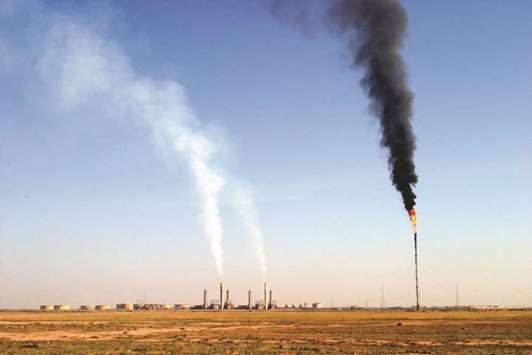Kurds stop pumping crude at two Kirkuk deposits: NOC official; oil flow to Turkish port slowing as Iraqi forces take control
Crude output in Iraq’s oil-rich Kirkuk province tumbled when two fields halted production as government troops pushed back Kurdish forces in an Iraqi offensive to regain control in the disputed area.
The Kurdish KAR Group stopped pumping crude at the Avana and Bai Hassan deposits after technicians failed to report for work and security guards left amid the fighting, an official at the central government-run North Oil Co said on Monday, without specifying how much oil the fields were producing before the halt. While the KAR Group operates the fields, NOC staff work with the Kurds at both sites, the official, asking not to be identified as they’re not authorised to speak to the media. Phone calls to the KAR Group yesterday went unanswered.
The halt could affect 275,000 bpd in output, according to estimates compiled by Bloomberg. Kirkuk’s oil fields export through a Kurdish-controlled pipeline to Turkey. The Turkish port of Ceyhan received crude from northern Iraq and the semi-autonomous Kurdish region at a pumping rate of 510,000 bpd yesterday, down from 600,000 on Monday, according to a port agent who asked not to be identified because the information isn’t public.
“There’s still a remaining threat of some sort of interruption,” said Edward Bell, a commodities analyst at Dubai- based bank Emirates NBD. “Given the political issues facing the Kurds, there’s always a lingering question mark over their level of exports.”
Kirkuk, home to Iraq’s oldest-producing oil fields, is at the centre of the power struggle between the central government in Baghdad and the Kurdistan Regional Government. Tensions in the northern province erupted into outright hostilities between the central government and the KRG on Monday following a Kurdish referendum on independence from Iraq. The KRG included Kirkuk in the September 25 referendum despite competing claims to the ethnically mixed area, which lies outside the boundaries of the KRG-ruled Kurdish region.
Iraqi forces on Monday seized the headquarters of Kirkuk’s provincial administration, as the government in Baghdad escalated its efforts to block the creation of a Kurdish state in the country’s north. On their way toward Kirkuk, Iraq’s army and allied militias took oil fields, a refinery and a military base from Kurdish control, according to state-run Iraqiya television.
Iraq, the second-largest producer in Opec, pumps most of its 4.47mn bpd from fields in the south and ships it from the Gulf port of Basra. But with Iraq supplying about 14% of total production from the Organization of Petroleum Exporting Countries, a deepening conflict in the north could roil crude markets.
Of the 275,000 bpd in production at disputed Kurdish-run fields in Kirkuk, the Bai Hassan field has been pumping 195,000 bpd while the Avana Dome – the central part of the giant Kirkuk field – has been producing 80,000. Iraqi federal police have taken control of Bai Hassan, Kirkuk provincial police spokesman Colonel Afrasiau Kamal said by phone yesterday, without elaborating on any plans to resume production at the field.
The Baghdad-controlled North Oil Co operates the Baba Dome – the southern part of the Kirkuk field – along with the nearby Jambur and Khabbaz fields, for a combined output of around 90,000 bpd, according to a map published in February by Western Zagros, a company operating in Iraq’s Kurdish region.

File photo of a refinery that handles some of the oil production in Kirkuk (file). Kirkuk, home to Iraq’s oldest-producing oil fields, is at the centre of the power struggle between the central government in Baghdad and the Kurdistan Regional Government.
